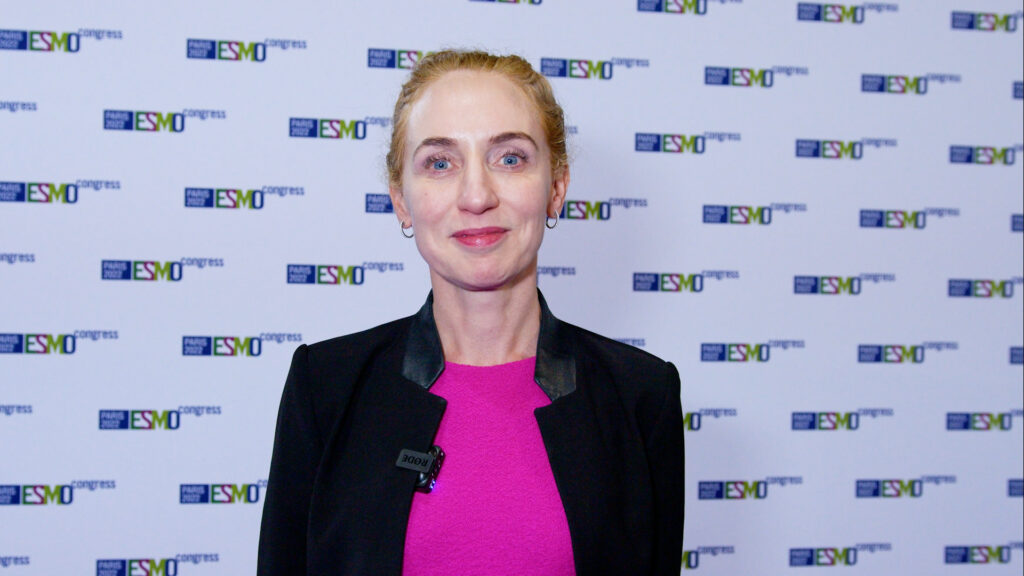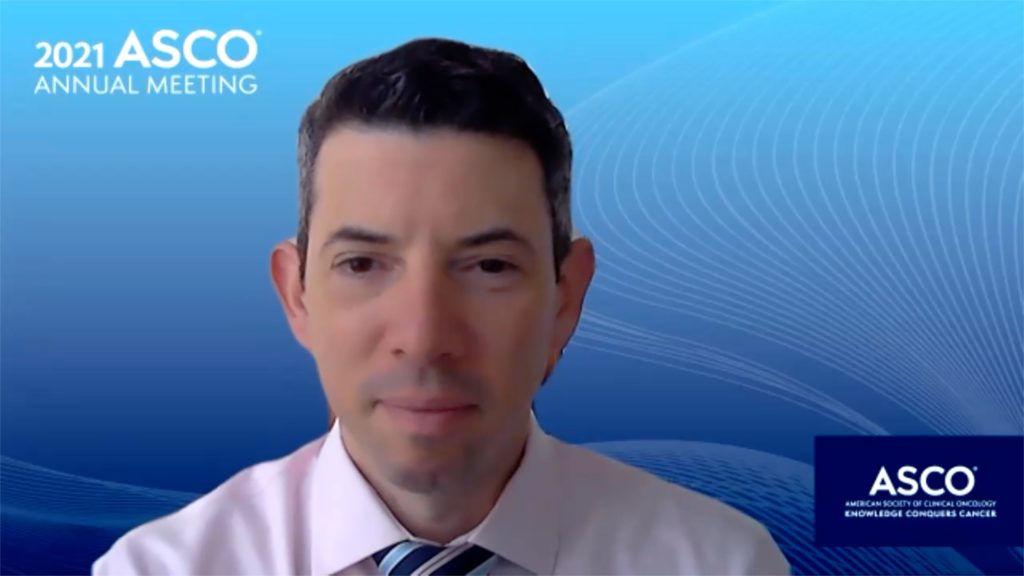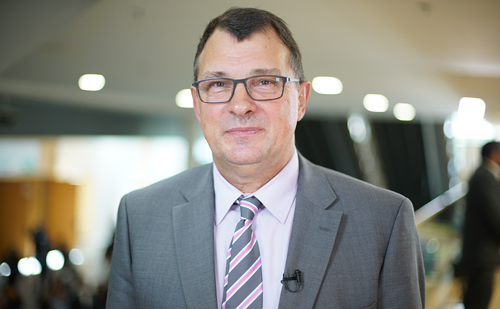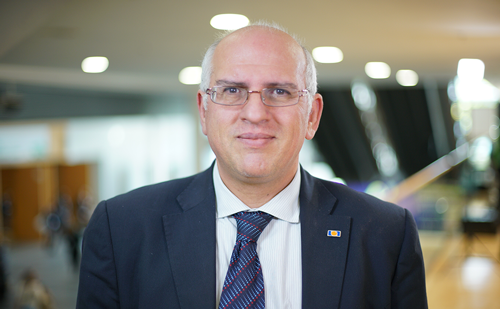The STARBOARD trial will investigate encorafenib, binimetinib and pembrolizumab as a combination therapy for BRAF V600 mutant melanoma. In this touchONCOLOGY interview, we speak with Dr Ryan Sullivan (Mass General Cancer Center, Boston, MA, USA) to discuss the mechanisms of encorafenib, binimetinib and pembrolizumab, as well as details on the STARBOARD trial.
The presentation entitled ‘Randomized phase 3 study (STARBOARD) evaluating encorafenib (enco) + binimetinib (bini) + pembrolizumab (pembro) for first-line treatment of unresectable locally advanced or metastatic BRAF V600-mutant melanoma’ (Abstract #CT069) was presented at the American Association for Cancer Research Meeting 2023, 14–19 April 2023.
Questions:
- What are encorafenib, binimetinib and pembrolizumab, and what are their mechanisms of action? (0:20)
- What are the aims, design, and eligibility criteria of the STARBOARD trial? (3:03)
- What are the primary and secondary endpoints and when should the results be expected? (5:03)
- How will these findings be used to inform future treatment decisions? (6:33)
Disclosures: Ryan Sullivan is a consultant for BMS, Merck, Novartis, Pfizer and Replimune and has received grant/research support from Merck.
Support: Interview and filming supported by Touch Medical Media. Interview conducted by Danielle Crosby.
Filmed as a highlight of AACR 2023
Access more content on dermatological cancers here
Transcript:
My name is Ryan Sullivan. I am a medical oncologist at the Mass General Cancer Centre in Boston and an associate professor at the Harvard Medical School, also in Boston.
Q. What are encorafenib, binimetinib and pembrolizumab, and what are their mechanisms of action?
Encorafinib is a BRAF inhibitor which blocks, quite potently, the mutated form of BRAF when it’s signalling. Binimetinib is a MEK inhibitor and the way the signal transduction pathway goes is there are upstream signals, although if you have a mutation at BRAF, you do not need the upstream signals to signal through the pathway. There’s RAF, there is MEK, and there is ERK, and then there are lots of other things. Therefore, blocking BRAF with encorafenib and MEK with binimetinib, is a sound strategy which has been proven to be better than just targeting BRAF by itself.
Pembrolizumab is a PD-1 inhibitor, so it is an immunotherapy that is targeting a receptor on T cells, which can interact with its tumour microenvironmental factors, which those factors in the tumour can prevent the T cells from from being fully effective at destroying the tumour. Therefore, inhibiting that can unleash those active T cells to better attack cancer.
The idea of combining them all together is is born out of a lot of preclinical and clinical research including analysis of samples that suggest that when you give BRAF and MEK inhibitors changes in the tumour environment that may make it a good idea to add in a PD-1 inhibitor as well, and there has actually been three randomized trials of BRAF, MEK plus either a PD-1 inhibitor or a PDL-1 inhibitor that have shown some benefit. One of those regimens, vemurafenib, cobimetinib and atezolizumab, met its primary endpoint and was approved by the FDA in the USA. Two other three drug regimens showed similar improvements in progression free survival, but they were not statistically significant and did not meet the bar for approval.
Both of those trials compared three drug regimens to BRAF MEK inhibition, which was important, I suppose, but is a limitation because, as I mentioned before, we tend to treat patients who have BRAF mutated melanoma with front line immunotherapy. It was hard to know what to make of the three drug regimen data without a direct comparison to immune therapies.
Q. What are the aims, design, and eligibility criteria of the STARBOARD trial?
The major aim is to compare encorafenib, binimetiib and pembrolizumab compared with pembrolizumab plus double placebo in patients with newly diagnosed BRAF V600 mutated metastatic or unresectable stage three melanoma.
It is a randomized phase III trial. The primary endpoint of this study is blinded independent central review of progression free survival, and a key secondary endpoint is overall survival.
In terms of specific inclusion and exclusion criteria, this is only a trial for cutaneous melanomas, so patients with mucosal or ocular melanoma will not be candidates for enrollment. Patients who have underlying either immune deficiency or autoimmune disease, particularly autoimmune disease requiring therapy within 2 years, are excluded, and patients who had prior therapy in the adjuvant or neoadjuvant setting are allowed to be enrolled, but they are not allowed to have had systemic therapy within 12 months of enrollment, and patients could not have had either prior BRAF or MEK inhibitors therapy or combination CTLA-4 or PD-1 therapy.
Another issue, patients cannot have prior or current symptomatic brain metastases, so small asymptomatic brain metastases are allowable. But patients with prior or on-going symptomatic brain metastases will not be allowed.
Finally, patients have to be able to swallow pills since the therapy includes two pills, although surely 12 pills a day, but they’re two different types of pills.
Q. What are the primary and secondary endpoints and when should the results be expected?
We are currently enrolling into this clinical trial, so it is hard to know exactly when we can expect a readout on the primary or secondary endpoints. We are hopeful that accrual will go well. It has been picking up over the past 6 months or so and we are hopeful that this trial will fully accrue in the coming months.
Once fully accrued, it is anticipated that it will not take that long to meet or at least to be able to read out on the primary endpoint. Though, it is hard to give it a specific time to expect results because it is dependent on accrual, the number of progression events that are happening and that somewhat is dependent on what types of patients people are recruiting to this trial. So there are a number of variables that are hard, particularly in this day and age where there are a lot of neoadjuvant and adjuvant therapy options for patients that may not directly change which patients are going on to the study but could influence and potentially even, in a good way, delay recurrences which is a good thing, but it can make enrollment to these types of clinical trials take a little longer.
Q. How will these findings be used to inform future treatment decisions?
In an ideal world, this will be a positive trial and that patients will have another potential treatment option in the front line setting for BRAF mutated melanoma.
In terms of the exact way this would be used, it is a regimen that has been seemingly well tolerated and something that could be incorporated into use.
I think ultimately, if this is a positive study, there will need to be some comparison with this combination to the other immunotherapy combinations that are approved. Because it is in some ways hard to know whether we should be throwing everything we have in the different types of therapies like BRAF targeted therapy and immunotherapy together or should be focusing just on immunotherapy as a starting, and then after that BRAF targeted therapy with or without immunotherapy, Those are questions that are that are easy to ask but hard to answer, particularly in the absence of data with this with this regimen.
But if we do have promising data with this regimen, I think it is very clear that it will be great to have another option for our patients and most importantly, there will be more questions that we will have to answer with well designed clinical trials to really sort out what is the best therapy for our patients with newly diagnosed BRAF mutated melanoma.
Subtitles and transcript are autogenerated











